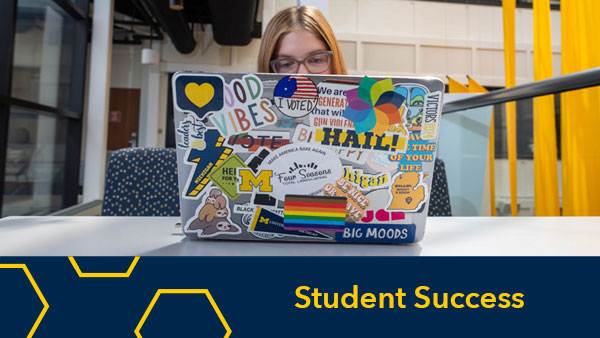Jen Vetter, Design Manager
Several members from the Office of Academic Innovation team will present sessions showcasing our work in accessibility, gameful course design, flipped classrooms and Teach-Outs at the 21st annual Enriching Scholarship conference, held at the University of Michigan from May 7-10, 2018. The multi-day event, which hosts sessions across U-M’s campus, focuses on effectively integrating teaching and technology through lightning talks, panels, workshops, and more.
We invite you to join us for these sessions to explore how our office is enriching scholarship through education, collaboration – and innovation!
The Alt Text Writing Jam: Learning Accessible Design by Doing It!
Tuesday, May 8, 10 a.m. to 12:00 p.m.
University Library Instructional Center (ULIC) – 4059 – Shapiro Library
Hosted by Rebecca Quintana, Stephanie Rosen, Yuanru Tan
What is the art and science of writing visual descriptions for course content? Instructors who use images within presentation slides do so to make content more engaging and understandable to students. However, students with visual impairments may not fully comprehend these images without a well-written visual description.
In this two-hour, hands-on workshop, you’ll learn effective methods for writing high-quality alternative text descriptions for visual elements such as photographs, tables, and charts. Reference materials and images will be provided by the facilitators. Participants are encouraged to contact Yuanru Tan ([email protected]) with any questions.
Building Motivation into Course Design: Gameful and GradeCraft
Wednesday, May 9, 10:00 a.m. to 12:00 p.m.
Shapiro Instructional Lab – 4041 – Shapiro Library
Hosted by Evan Straub
Have you heard about GradeCraft? GradeCraft is a tool built at the University of Michigan based on the principles that make games motivating. By offering students greater choice in the paths by which they pursue their assessments, creating transparent assessment systems and building up from zero, we have seen greater student engagement and satisfaction with courses here at University of Michigan. In addition, GradeCraft allows students to plan for the grade they want by using the Grade Predictor, which tracks assignments completed as well as assignments a student would like to do.
In this session, we’ll discuss the principles of gameful course design, go through some planning on how to redesign some (or all) of your class, and get started using GradeCraft.
Flipping Your Classroom: The Nuts and Bolts
Wednesday, May 9, 3:00 p.m. to 4:30 p.m.
CRLT Seminar Room – 1013 – Palmer Commons
Hosted by Evan Straub, Nicole Tuttle
The “flipped classroom” has garnered considerable attention in the academy in recent years. This approach to teaching involves the use of podcasting, videos, and other strategies to shift students’ initial exposure to content from the lecture hall to outside of the classroom. In the process, significant portions of class time are freed up for active learning and student engagement.
In this workshop, participants will explore teaching in a flipped classroom and consider how to use this approach in their own teaching. The session will highlight general principles for designing a flipped lesson, including how to hold students accountable for completing pre-class work. The workshop will provide an introduction to relevant instructional technologies and campus resources around them. Finally, participants will explore strategies for designing instruction to engage students during class time.
From MOOCs to Teach-Outs: An Emerging Format
Thursday, May 10, 1:00 p.m. to 2:00 p.m.
University Library Instructional Center (ULIC) – 4059 – Shapiro Library
Hosted by Jeff Bennett, Jen Vetter, Steve Welsh
In the years since their inception, Massive Open Online Courses (MOOCs) have matured into a medium with a wide range of variable objectives and design models. Last year, the U-M Office of Academic Innovation piloted a series of nine Teach-Outs using MOOC platforms to engage a global audience around topics of pressing social urgency. Inspired by the Teach-Ins of 1965, the Teach-Out model was conceived as a two-day participatory learning opportunity providing 1-4 hours of content, with a constructivist emphasis on active community discussion. In contrast to a conventional assessment design, Teach-Outs culminate in a call to action intended to effect change at the individual, community, or broader societal level.
In this session, Michigan’s Teach-Out project team will present several case studies of innovative course design, focusing on moving from MOOCs as we have known them to a more agile, event-oriented model with narrower learning objectives and learner-centered outcomes. We will conclude with some generalizable findings with relevance for constructivist online course environments.
All Enriching Scholarship sessions are FREE and open to all members of the U-M community, but require registration. Click HERE to view a list of all sessions.
Sponsors include CRLT, U-M Academic Innovation, U-M Library, LSA Instructional Support Services, LSA Language Resource Center, and HITS (Health Information & Technology Services).
Join us May 7-10 for Enriching Scholarship 2018!


